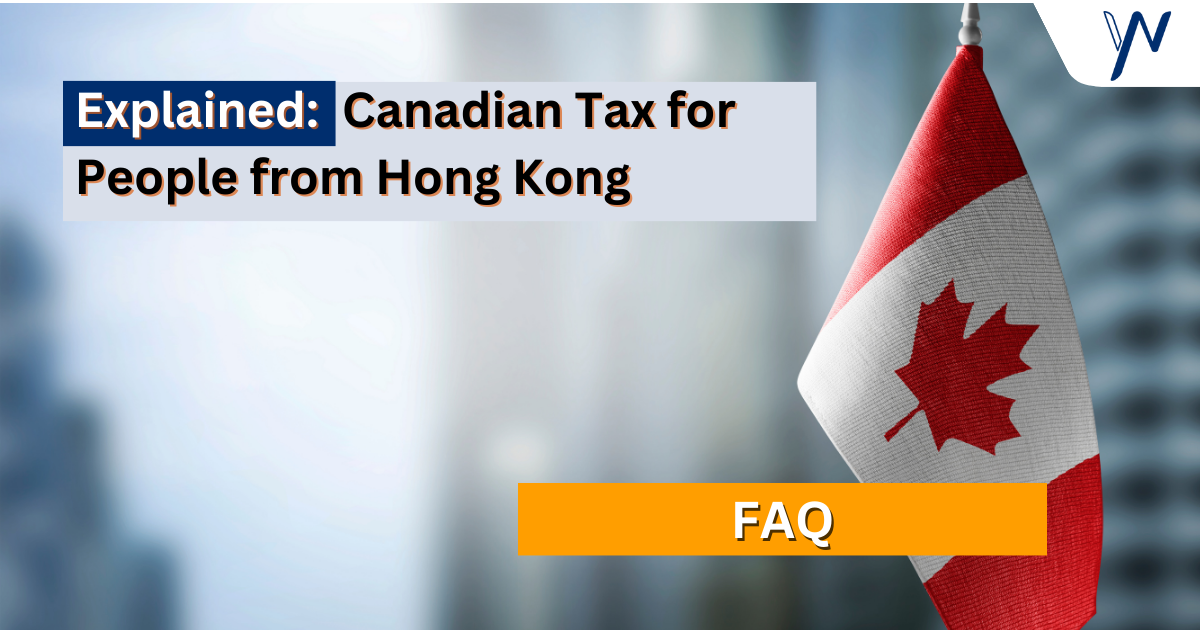There are over 300,000 Canadians currently living in Hong Kong, and in the past few years, Canada has become an increasingly popular destination for Hong Kong people to immigrate to. As of 2023, about 21,000 people from Hong Kong have been granted Canadian Work Permits and thousands more have become Canadian permanent residents. So it’s not surprising that we receive so many questions about Canadian Taxes and how it applies to Hong Kong people.
In this article, we will explain a few major Canadian tax issues relevant to Hong Kong people:
- What types of Canadian taxes are there?
- When do people from Hong Kong have to pay Canadian taxes?
- What are the main factors that determine whether a person from Hong Kong is a Canadian tax resident?
- What is the Sojourner’s Rule – Visitors who stay in Canada for 183 days or more
- If I am moving to or away from Canada, should I sell my property?
- Do I need to file a Canadian tax return?
Types of Canadian Taxes
For HK ppl immigrating to Canada, there are a few particular types of Canadian taxes most relevant to them. We will highlight them and explain their relevance to people from Hong Kong.
Personal Income Tax
Personal income taxes are calculated by adding together what you owe in Federal taxes and what you owe in Provincial taxes. Both Federal and Provincial taxes are progressive, which means the higher your income, the higher percentage of taxes you pay. Here are tax rates for both Federal and Provincial income taxes:
Canadian Federal Income Tax Rates
- 15% up to $53,359 of taxable income.
- 20.5% between $53,359 and $106,717.
- 26% between $106,717 and $165,430.
- 29% between $165,430 up to $235,675.
- 33% on any amount taxable income exceeding $235,675.
Provincial Income Tax Rates for British Columbia and Ontario
British Columbia
- 06% up to $45,654 of taxable income
- 7% between $45,654 and $91,310
- 5% between $91,310 and $104,835
- 29% between $104,835 and $127,299
- 7% between $127,299 and $172,602
- 8% on any amount exceeding $172,602 and $240,716
- 5% on any taxable income exceeding $240,716
Ontario
- 05% up to $49,231 of taxable income
- 15% between $49,231 and $98,463
- 16% between $98,463 and $150,000
- 16% between $150,000 and $220,000
- 16% on any taxable income exceeding $220,000
Capital Gains Taxes
Unlike Hong Kong, capital gains in Canada are treated as taxable income. Which means that when you make money from selling stocks or property that has appreciated, you may need to pay taxes on some of those gains.
As of 2023, half of capital gains will be considered taxable personal income, and it will be added to your income that year. For example, if your salary is $70,000 and you made $40,000 of profit from selling an investment property, $20,000 (half of the $40,000) will be to your $70,000 income. Therefore, your personal income for the year will be $90,000.
For non-residents of Canada, there is a 25% withholding tax on capital gains, of which half can be returned, meaning an effective capital gains tax rate of only 12.5%.
GST (Goods and Services Tax) and HST (Harmonised Sales Tax)
Also unlike Hong Kong, Canada has 2 types of sales tax imposed on the purchase of goods and services, and the tax rates will be different depending on which area of Canada you are in. Some provinces will charge a GST (Federal Tax) along with a PST (Provincial Tax), while in other areas of Canada, the GST and PST has been harmonised into a single HST (Harmonised Sales Tax).
Canadian Tax Residency:
Do people in Hong Kong need to pay Canadian Taxes?
Section 2(1) of the Canada Income Tax Act states that income taxes shall be paid by people who are residents of Canada.
Whether a Hong Kong person needs to pay Canadian Income Taxes will be determined by whether they are a Canadian Tax Resident. But how does Canada determine whether a person is a tax resident of Canada?
Significant Residential Ties to Canada
Canada will consider a person with significant residential ties to Canada as a Canadian Tax Resident.
Major factors that will be considered are:
Where your home is, and
Where your spouse and children live.
If you have a home in Canada, and your spouse and children are all living in that home in Canada, there is a high likelihood that you will be treated as a Canadian tax resident. However, case law seems to suggest that there is different treatment towards people that are immigrants to Canada and people that were born in Canada.
Different Treatment of Immigrants vs. People Born in Canada
There are a few landmark cases that have set the precedence for determining Canadian Tax Residency.
Thomson Case:
The Thomson case was precedent setting in terms of deciding what significant residential ties to Canada meant. Thomson argued that he was not a tax resident of Canada, because he lived most of the year in the United States. However, the court ruled that Thomson was a Canadian tax resident because:
- his wife lived in Canada
- he had built a large home in Canada
- he had servants living in the Canadian home
Canada treats immigrants differently when it comes to tax residency
Shih, Mahmood, Song, Yoon Cases:
These 4 cases had a common element, each case was an individual who immigrated to Canada, and the judge decided that they were not Canadian tax residents, although they all had elements of significant residential ties.
The Shih Case is particularly relevant to people from Hong Kong who immigrate to Canada. Shih and his family immigrated to Canada from Taiwan. His wife and 3 kids lived in Canada, while Shih would return to Taiwan to work. Shih regularly visited Canada to see his family, and his family owned a Canadian home, Canadian investments, and he had a driver’s license. Judging by these facts alone, it would seem that Shih was a Canadian tax resident. However, the judge ruled that Shih was not a Canadian tax resident, because:
- Shih never stayed in Canada more than 3 months at a time
- Shih was still working in Taiwan
- Shih still had family members in Taiwan
- He owned a property in Taiwan
- He was still a member of several social clubs in Taiwan
- He maintained a Taiwan Driver’s License
- He maintained a Taiwan bank account
The Shih case is monumental to Hong Kong immigrants, as it is common for one spouse to live in Canada to take care of the children, while the other spouse remains in Hong Kong to earn money, visiting Canada a few times a year.
Sojourners Rule – visitors who stay 183 days or more in Canada
The Sojourner’s Rule applies to visitors who do not have significant residential ties to Canada but has stayed 183 days or more. Section 250(1) of the Canadian Income Tax Act, these visitors will be deemed as residents in Canada, making their income taxable.
Situations where Canadian Non-Residents may still need to pay Canadian taxes
Even if you are a Canadian Non-Resident, you’ll still need to pay Canadian Taxes if:
- You were employed in Canada
- You carried on a business in Canada or
- You sold a Canadian Property, which brings us to our next common issue for Hong Kong Canadian immigrants…
I am immigrating to or away from Canada, should I sell my properties?
Canadian Properties
- If you are living in Hong Kong or moving back to Hong Kong, consider transferring your principal residence property to your spouse if he or she will remain in Canada. As of 2016, you can no longer claim your property as a principal residence, if the name on the property is a non-resident. In effect, you might owe capital gains taxes on the appreciation of that property.
- Rental properties: If you own rental properties, do not sell them before leaving Canada, as non-residents actually enjoy a lower effective tax rates on selling rental properties. When a non-resident sells an investment property, there is a 25% withholding tax, of which half is returned to you, making the effective tax rate, 12.5%
Hong Kong Properties
- If you own a Hong Kong property, the market value of your Hong Kong property on the day you become a Canadian Permanent Resident, is now the new cost basis. This means that you only pay capital gains on any amount you sold your property for, over that market value. For example:
You purchased a property in 2008 for HK$2,000,000.
You become a permanent resident in 2018, and the market value of the property is HK$6,000,000.
You sell the property in 2021 for HK$7,500,000.
The capital gains will be the selling price less the market value in 2018, HK$1,500,000
(HK$7,500,000 – HK$6,000,000).
Do I need to file a Canadian tax return?
If you are leaving Canada
You will need to file 2 separate tax returns for the year you leave Canada, one that spans from January 1st to your date of departure, and the other from the date of departure to December 31st.
If you are immigrating to Canada
You should file a tax return if you have received your Canadian Permanent Resident status. You also need to file a tax return if you are non a Canadian Permanent Resident, but you were employed in Canada, carried on a business in Canada, or have Canadian capital gains that you may owe taxes on.










